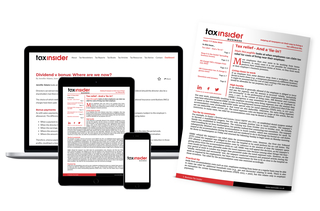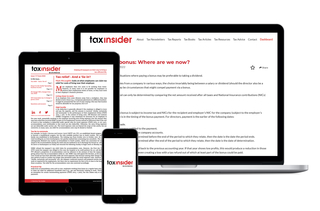Business Tax Insider Monthly Newsletter
Subscribe to our monthly business tax newsletter and tax article library and receive news, tips and strategies guaranteed to minimise your business tax bill
 DIGITAL & PRINT
DIGITAL & PRINT
- 14 day free trial
- Up to date monthly tax saving tips
- New tax strategies added every month (48 over the year)
- No minimum tie-ins, cancel anytime
Business Tax Insider subscription benefits
We recently asked our subscribers what they love about Business Tax Insider.
These are the top 7 reasons that they gave us:
-
Guaranteed ROI After 90 days, if you've not saved money on your tax bill we'll give you a prompt refund
-
Proactive We bring relevant, actionable tax saving opportunities directly to you
-
Time saving Don't waste your precious time searching for answers to tax questions on the Internet
-
Powerful Use our data, articles and information to take control of your finances
-
Safe Keep up to date, so you don't get caught out by new rules and regulations
-
Simplifying Our publications simplify complex tax rules into easily digestible, actionable points
-
Balanced We help you find a balance between saving money versus ethical & legal compliance
Here are just some of the strategies our tax experts are sharing with subscribers
-
HMRC enquiries: A sting in the tail
Enquiries by HM Revenue and Customs (HMRC) involving businesses often extend to the business owners themselves. Tax return adjustments can occur, even for honest business owners.
Mark McLaughlin looks at ‘close’ company overdrawn directors’ loan accounts and tax liabilities under the ‘loans to participators’ rules, following HMRC enquiries.
-
HMRC has car trouble!
We have a special regime for the taxation of motor vehicles, the principles of which were set out many years ago. But there is still scope for disagreement with HMRC, and it often does not go HMRC’s way.
Lee Sharpe highlights several problem areas for HMRC with the taxation of motor vehicles, where the taxpayer may stand to benefit.
-
Valuable tax pointers about succession planning
Vincent was at home recovering from a very nasty bout of pneumonia. He had been hospitalised for over three weeks and had to spend his 64th birthday in a hospital bed. However, it was the first time that he had time to really think about his life and the future of ‘his’ property construction consultancy business, which he ran through his 100% owned company, Starry Night Consultants Ltd (SNCL). He was pleased to learn that the company’s senior management team had really stepped up to the plate during his illness. And they had managed without him for over two months now.
Peter Rayney shares some valuable pointers about succession planning based on a recent client experience.
-
Is operating through a personal company still worthwhile?
Historically, from a tax perspective it has been preferable to operate a business as a personal company and extract profit in the form of a small salary plus dividends than to run an unincorporated business.
Sarah Bradford looks at the impact of recent tax and National Insurance contributions changes.
-
Q&As with Arthur Weller
Our Business Tax Insider articles April 2024
-
Still beneficial to benefit?
There is scope for directors of owner-managed companies to maximise their remuneration package in a tax-efficient way by utilising benefits-in-kind (i.e., goods or services provided by the company either for free or at a reduced cost). Generally, the cost of providing a benefit is a tax-deductible expense for the company as a cost of employment, whilst the benefit can be either taxable or exempt for the director.
Joe Brough looks at benefits-in-kind commonly provided to directors of owner-managed companies, and considers whether these are still beneficial, and outlines traps to avoid.
-
A painless extraction? Family company remuneration
As the 2023/24 tax year draws to a close, directors of personal and family companies should be reviewing the profits they have taken from their company so far in the tax year and considering whether it would be worthwhile to extract further profits before the end of the tax year on 5 April 2024.
Sarah Bradford considers what might constitute an optimal profit extraction strategy for 2023/24.
-
Business contracts and agreements: Think them through!
Contracts and agreements sometimes state one thing but mean another. When a taxpayer asks HM Revenue and Customs (HMRC) to treat an event or transaction as the parties intended, as opposed to in an unintentional way based on an inaccurately or imprecisely drafted contract or agreement, HMRC’s response is invariably that the tax treatment must follow the terms of the contract or agreement, even when the tax consequences are unexpected and more costly to the taxpayer.
Mark McLaughlin highlights the importance of ensuring that business contracts and agreements are drafted carefully to avoid unexpected and expensive tax consequences.
-
Limited companies versus LLPs
This table takes a bird’s eye view of the approach to taxing companies versus taxing limited liability partnerships (LLPs):
Lee Sharpe compares and contrasts the treatment of limited companies and limited liability partnerships
-
Q&As with Arthur Weller
Our Business Tax Insider articles March 2024
-
Dividends or bonuses? We can work it out!
Consider the following scenario:
'On a wintry sunny morning, Alan was reviewing his company’s January 2024 management accounts. Alan was the sole director and 100% shareholder of Llandudno Hotels Ltd, which operated two large hotels in Llandudno. The business was on course to healthy pre-tax profit of around £650,000 for the year ended 31 March 2024. Alan had been planning to pay himself a substantial ‘bonus’ before the year-end'.
What does Alan do?
Peter Rayney examines an owner-manager’s cash extraction following the numerous tax and National Insurance contributions changes.
-
Use them or lose them: 2023/24 tax allowances
As the tax year draws to a close, it is prudent to review one’s 2023/24 tax allowances and consider whether there is scope for utilising any unused allowances so they are not lost.
Sarah Bradford explores options for using 2023/24 tax allowances so they are not wasted.
-
Record-keeping in a digital age
Lee Sharpe looks at taxpayers’ record-keeping obligations in light of HMRC’s inexorable march to digital everything (almost).
Historically, HMRC has been quite relaxed about whether original records must be maintained or digital facsimiles (scans, etc.).
-
Trap for business owners seeking CGT incorporation relief
HM Revenue and Customs (HMRC) recently commenced a ‘One to Many’ campaign, targeting taxpayers who incorporated property businesses in the tax year 2017/18 but reported no capital gains tax (CGT) liability in their tax returns on the basis that ‘incorporation relief’ applied in full.
Mark McLaughlin highlights a potential trap for business owners seeking capital gains tax incorporation relief.
-
Q&As with Arthur Weller
 DIGITAL & PRINT
DIGITAL & PRINT
- 14 day free trial
- Up to date monthly tax saving tips
- New tax strategies added every month (48 over the year)
- No minimum tie-ins, cancel anytime
OR, if you are ready to save money on your tax bill...
 DIGITAL & PRINT
DIGITAL & PRINT
- 14 day free trial
- Up to date monthly tax saving tips
- New tax strategies added every month (48 over the year)
- No minimum tie-ins, cancel anytime




